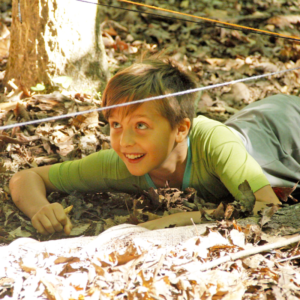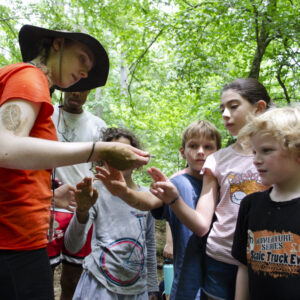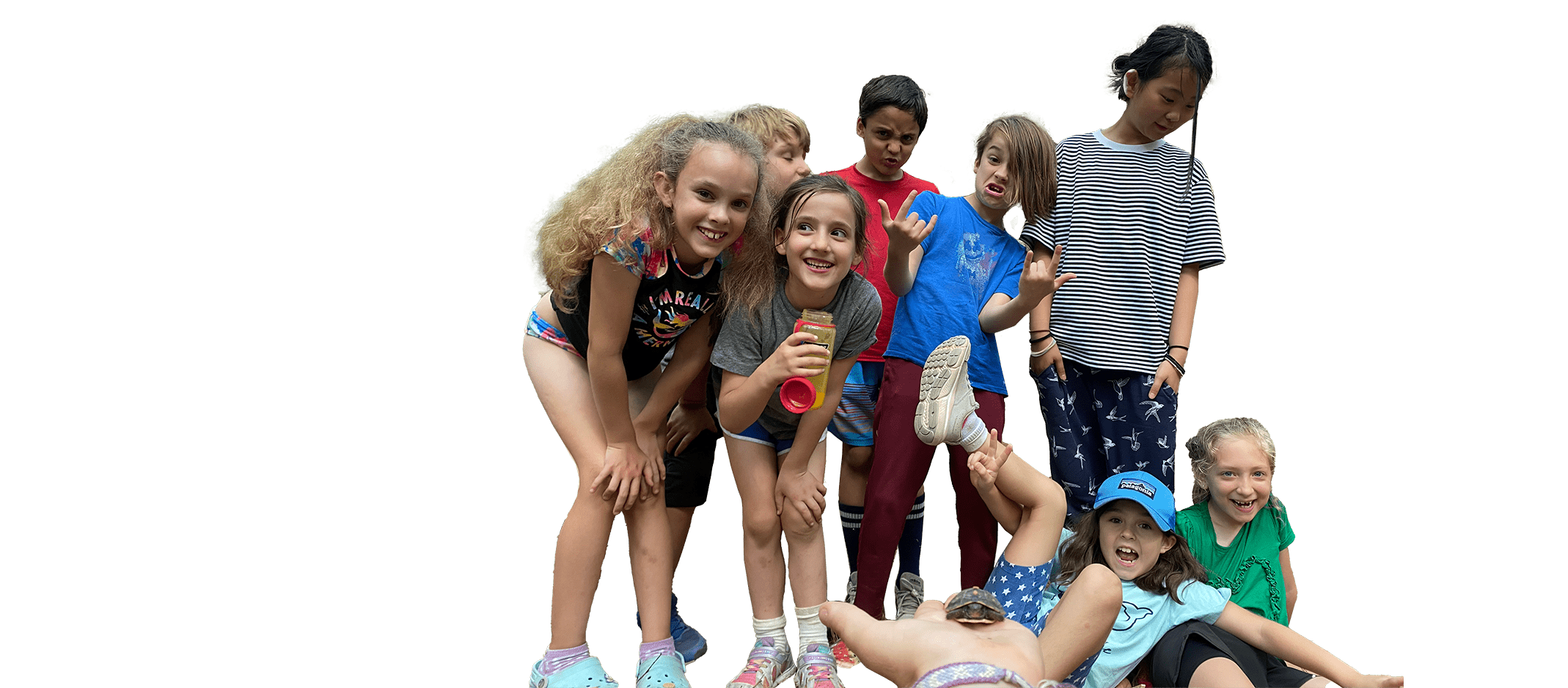 Are you looking for a summer camp that offers your child a chance to explore and connect with nature? Whether you are a parent sending your child to summer camp for the first time or simply on the hunt for a new summer camp experience for your kids, our summer camp enthusiasts have everything you need to know to pick the perfect summer program for your little one!
Are you looking for a summer camp that offers your child a chance to explore and connect with nature? Whether you are a parent sending your child to summer camp for the first time or simply on the hunt for a new summer camp experience for your kids, our summer camp enthusiasts have everything you need to know to pick the perfect summer program for your little one!
With three different summer programs in and around the Raleigh area, our unique outdoor summer camp experiences provide kids with hands-on experiences in the great outdoors, helping them to develop important skills and a lifelong love of nature. Whether your child loves hiking, wildlife, art, or adventure, the Schoolhouse of Wonder has a program that’s sure to excite and inspire.
In this ultimate guide to summer camp, we’ll explore the different types of programs offered, the benefits of attending summer camp, and what you can expect when your child attends. So if you’re ready to give your child an unforgettable summer experience, read on to learn more about why summer camp is a beneficial experience for children of all ages.
What is a Summer Camp?: A Parent’s Introduction
Outdoor summer camps can vary widely in terms of activities, length, and intensity, but they all share a focus on connecting with nature and developing skills and self-confidence. At most summer camps, like Schoolhouse of Wonder’s outdoor summer day camp in Durham, North Carolina, campers can expect to engage in a wide range of activities, from hiking and swimming to nature exploration and team-building exercises.
These summer programs are designed to help children and teens build resilience, confidence, and independence, as they learn to navigate the challenges and opportunities that come with being in the great outdoors. Campers also have the opportunity to form deep and lasting connections with their peers, as they work together to tackle new challenges and explore the natural world around them.
Benefits of Summer Camps
Summer camps provide a variety of benefits for children and teens, from socialization to skill-building to exposure to new experiences. These programs offer a unique environment where kids can learn and grow in a fun and supportive setting, away from the pressures of school and everyday life.
Socialization
 Summer camps offer children and teens the opportunity to make new friends and build social skills in a supportive and inclusive environment. By participating in group activities and living in a community setting, campers learn how to work with others, communicate effectively, and develop strong interpersonal relationships.
Summer camps offer children and teens the opportunity to make new friends and build social skills in a supportive and inclusive environment. By participating in group activities and living in a community setting, campers learn how to work with others, communicate effectively, and develop strong interpersonal relationships.
Skill-building
Summer camps provide a wide range of opportunities for children and teens to learn new skills and develop their talents. Whether it’s learning how to swim, playing an instrument, or mastering a new sport, summer camp provides a safe and supportive environment for kids to try new things and build their confidence.
Independence
Summer camps offer children and teens the opportunity to develop their independence and self-reliance. By spending time away from home and learning to make their own decisions, campers gain valuable life skills and learn to take responsibility for their own actions.
Physical activity
Summer camps provide a fun and engaging way for kids to stay active and healthy over the summer months. Whether it’s playing sports, hiking, swimming, or engaging in other outdoor activities, summer camp offers plenty of opportunities for kids to get moving and enjoy the great outdoors.
Exposure to new experiences
Summer camps offer children and teens the chance to try new things and experience a variety of activities and challenges that they might not have access to otherwise. From arts and crafts to outdoor adventures to cultural immersion, summer camp provides a unique and enriching experience that can broaden a child’s horizons and help them discover new interests and passions.
Choosing a Summer Camp
 Choosing the right Raleigh summer camp for your child can be a daunting task. With so many options available, it’s important to do your research and consider a variety of factors before making a decision.
Choosing the right Raleigh summer camp for your child can be a daunting task. With so many options available, it’s important to do your research and consider a variety of factors before making a decision.
Researching Summer Camp Options
One of the first steps in choosing a summer camp is to research your options. Look online, talk to friends and family, and attend camp fairs and open houses to learn more about the different summer programs available in your area. Take notes, make a list of potential options, and consider what each program has to offer.
Considering Your Child’s Interests and Needs
When choosing a summer camp, it’s important to consider your child’s interests, abilities, and needs. Think about what your child enjoys doing, what they’re good at, and what challenges they might want to tackle over the summer. Also, consider any special needs or accommodations that your child may require, such as medical or dietary needs.
Evaluating the Camp’s Safety and Staff Qualifications
Safety is a top priority when choosing a summer camp. Look for programs that are accredited or licensed, and ask about the camp’s safety policies and procedures. Also, consider the qualifications and training of the camp staff, and make sure that they have experience working with children and are trained in first aid and CPR.
Making a Final Decision
After researching your options, considering your child’s needs, and evaluating safety and staff qualifications, it’s time to make a final decision. Take all of these factors into account, as well as the cost and location of the program, and choose the summer camp that best meets your child’s needs and your family’s preferences.
What Parents Should Look for in Summer Camps
When choosing a summer camp in Chapel Hill and the surrounding areas for your child, there are several important factors to consider to ensure that you choose a program that is safe, engaging, and aligned with your family’s needs and values.
Safety Measures
Ask about the camp’s safety policies and procedures, including emergency protocols, staff training, and background checks. Look for programs that prioritize camper safety and take steps to mitigate risks.
Staff Qualifications and Training
Find out about the qualifications and training of the camp staff, including their experience working with children and any certifications or licenses they hold. Look for programs that provide ongoing training and support for their staff.
Camper-to-Counselor Ratio
Consider the camper-to-counselor ratio at the camp, as this can impact the quality of supervision and individual attention that each camper receives. Look for programs with a low camper-to-counselor ratio to ensure that your child receives the support and guidance they need.
Age Appropriate Activities
Make sure that the camp offers activities and programming that are appropriate for your child’s age and interests. Look for programs that offer a range of activities, from sports and games to arts and crafts to outdoor adventures.
Communication Policies
Ask about the camp’s communication policies and procedures, including how and when you will be able to communicate with your child during their time at camp. Look for programs that prioritize regular communication and transparency.
Health and Medical Facilities
Find out about the camp’s health and medical facilities, including the availability of trained medical staff and emergency equipment. Look for programs that have a well-equipped health center and can provide care for a range of medical needs.
Special Needs Accommodations
If your child has special needs or requires accommodations, make sure that the camp can provide the necessary support and resources. Look for programs that have experience working with children with a range of needs and can provide individualized care.
Cost and Financial Aid Options
Consider the cost of the camp and any financial aid or scholarship options that may be available. Look for programs that offer transparent pricing and a range of payment options.
Reviews and Feedback from Previous Campers and Parents
Read reviews and feedback from parents and previous campers to get a sense of the camp’s reputation and the experiences of past attendees. Look for programs with positive reviews and a track record of providing high-quality programming and support.
Alignment with Personal Values and Beliefs
Consider whether the camp’s mission and values align with your family’s personal values and beliefs. Look for programs that prioritize inclusivity, diversity, and respect, and that promote positive social and environmental values.
Preparing Your Child for Summer Camp
Sending your child off to summer camp in Raleigh can be an exciting and nerve-wracking experience for both you and your child. However, by taking some simple steps to prepare, you can help your child feel confident and excited about their upcoming adventure.
Packing Essentials
Help your child pack the essentials they will need for camp, such as appropriate clothing, toiletries, and any necessary gear or equipment. Check with the camp staff to see if there are any specific packing guidelines or restrictions.
Communicating with Camp Staff
Stay in touch with the camp staff and communicate any important information about your child’s needs or concerns. Make sure that you provide emergency contact information and that the camp staff knows how to reach you in case of an emergency.
Addressing Concerns or Special Needs
If your child has any concerns or special needs, make sure to address these with the camp staff in advance. This may include things like dietary restrictions, allergies, medical needs, or emotional concerns.
Helping Your Child Feel Prepared
Talk to your child about what to expect at summer camp, and help them feel prepared and excited for their adventure. Encourage your child to ask questions and express any concerns they may have, and provide them with the emotional support they need to feel confident and secure.
What to Expect at a Day of Outdoor Summer Camp
A typical day at outdoor summer camp can be quite different from your child’s usual routine. They’ll spend the day engaged in a variety of outdoor activities, from hiking and swimming to arts and crafts to team-building exercises and more.
Encouraging Independence
Outdoor Durham summer camps are designed to help children and teens develop their independence and self-reliance. Campers are encouraged to make their own decisions, take responsibility for their actions, and work together with their peers to tackle challenges.
Resolving Issues with Camp Staff
If you have any concerns or issues with your child’s experience at camp, it’s important to address these with the camp staff as soon as possible. They are there to support your child and ensure that they have a positive and safe experience.
Addressing Homesickness or Other Concerns
Some children may experience homesickness or other concerns while at camp. It’s important to provide your child with emotional support and encourage them to talk to the camp staff about any concerns or issues they may have.
What Happens After Summer Camp?
After the summer camp experience is over, your child may be coming home feeling tired, emotional, and excited to share their experiences– in fact, Schoolhouse of Wonder has a “Dirty, Tired, and Happy” guarantee! As a parent, it’s important to help children reflect on what they’ve learned, incorporate lessons into daily life, and plan for next year’s camp experience.
Reflecting on the Experience
Take some time to reflect on your child’s Orange County summer camp experience. Talk to your child about what they enjoyed, what they learned, and what they found challenging. Help them process their emotions and reflect on how they’ve grown and changed over the summer.
Encouraging Your Child to Share Their Experiences
Encourage your child to share their summer camp experiences with family and friends. This may include showing photos, telling stories, or even creating a scrapbook or journal. This can help reinforce the lessons and memories learned at camp.
Incorporating Lessons Learned into Daily Life
Help your child incorporate the lessons they learned at camp into their daily life. This may include practicing new skills, trying new activities, or adopting new habits or values. Use the summer camp experience as an opportunity for personal growth and development.
Planning for Next Year
If your child enjoyed their summer camp experience, start planning for next year’s program. Talk to your child about what they’d like to do differently or the same next year, and start researching programs that match their interests and needs. This can help build excitement and anticipation for the next summer camp adventure.
Enroll Your Child in a Schoolhouse of Wonder Outdoor Summer Camp for 2023!
Sending your child to an outdoor summer camp program can be an enriching and transformative experience. From developing social skills and independence to learning new activities and exploring the natural world, summer camp can help your child grow in countless ways. By researching your options, preparing your child for camp, and reflecting on the experience afterward, you can ensure that your child has a positive and rewarding summer camp experience.
If you’re looking for a summer camp that offers all of these benefits and more, we invite you to enroll your child in a Schoolhouse of Wonder outdoor summer camp program for 2023. With experienced and trained staff, age-appropriate activities, and a focus on nature and play-based learning, Schoolhouse of Wonder provides a fun and engaging summer camp experience that your child will never forget. Don’t miss out on this opportunity to give your child the gift of summer camp– enroll in Schoolhouse of Wonder today!
Contact us today by calling us at 919-477-2116 or filling out our contact form.



